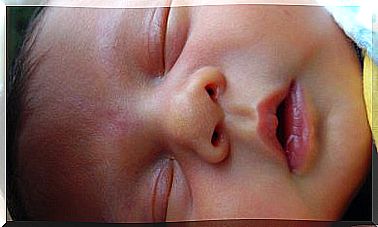Mom, Don’t Let Me Cry: Serve Me With Your Closeness

Do not do it. Never let your baby cry thinking that this is how they mature earlier or that in the end, they will end up falling asleep. According to psychosomatic medicine specialists at the University of Munich, letting babies cry and not attending to them would have serious consequences on their brain development.
We have spent many years under that behavioral and even reductionist idea that recommended that we let the baby cry. In this way, they said , he improved his lung capacity and understood that Mom and Dad cannot always be on top of him. That growing is also learning to be alone, to turn off your fears for yourself.
However, in this age something essential we were forgetting something essential. No baby can arrive at this reasoning on his own from a basic fact: A child’s immature brain is governed only by instinctual needs : hunger, fear, and the need to feel safe.
What we do as mothers and fathers in those first months of life is crucial for their later development. We must be very aware that a baby comes into the world as the most helpless being in the world, and the fact of being born does not mean that its development is complete. On the contrary, you will need at least two years of intimate closeness and continuous attention.
Don’t let me cry, don’t neglect me emotionally
We are sure that none of us usually ignores a family member or friend when crying. The human being has an emotional brain and mirror neurons that make us empathize with those who suffer to care, to offer comfort and, in this way, take care of our social group.
So… if we attend to the tears of adults, why not do it with a crying baby? Crying is a defense and survival mechanism in children, it is their only means of communicating with us, therefore, it makes no sense to neglect it.

The baby who is cared for will become an adult with less stress
The University of Notre Dame in the United States conducted an interesting longitudinal study over several decades where the type of care received in the first months of life was related, and the subsequent relationship when it comes to managing stress better or worse.
The conclusions drawn throughout those years in 600 children, showed that Those children whose cries were always attended and comforted, now in adulthood, have better mental health and better cope with states of anxiety and stress.
All of this invites us to take into account several details:
- A baby’s brain is very sensitive to the impact of stress.
- Structures such as the brain amygdala, related to negative emotions such as fear, the feeling of abandonment or threat, are very active in those first months of life.
- If a baby understands that crying is not going to do him much good, he will release a higher level of cortisol into the blood. That excess cortisol will always inhabit your brain, so that in early childhood or adolescence, it will cause you to emit excessive responses to frustration, anger or fear.

I attend to your cry so that you understand that I am with you
Something that a child will understand over time is that mom and dad are not there to offer everything he wants but to give him what he needs.
- This is an aspect that we must also be clear about. Babies, and more during the first 6 months, do not want anything on a whim, they do not seek to manipulate us, they have specific and vital needs : food and attention.
- We must also remember that a baby has spent 9 months in its mother’s womb having everything: food, warmth, security and closeness. Remember that a fetus, when it develops its hearing, listens to your voice throughout the day, it is something familiar and reassuring.
- Something as basic as putting the newborn in the crib and turning off the light is traumatic for many babies. You feel threatened, you feel fear and you think you have been abandoned.
Pediatricians always tell us about the importance of closeness during the 6 months, essential time in which we carry out breastfeeding. However.. .And what happens beyond 6 months? Does it perhaps mean that a child has already matured and is capable of crying only on a whim?
Not at all, specialists remind us that we should never let a child cry for more than 5 minutes at a time. From 0 to 3 years you have before you a magical period but full of needs. Sometimes, it can be very stressful, we are clear about it, but with the help of everyone and always having a parenting based on healthy attachment, affection and attention from crying, we will get much more emotionally mature children tomorrow.









